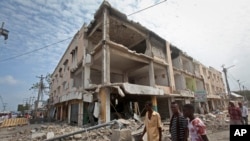For too long, Somalis have suffered an unceasing campaign of terrorist violence. Since the beginning of the year, terrorists have perpetrated over 40 acts of terrorism using armed suicide assaults, truck bombs, and remotely detonated improvised explosive devices in Mogadishu alone. And then, in mid-October, the most devastating attack in Somali history took place.
On October 14th, the streets of Mogadishu’s Hodan district were jam-packed with traffic and by-standers, when a truck loaded with explosives detonated, killing at least 400 people and wounding hundreds of others. Shortly thereafter, a second, smaller explosion, believed to have been part of a coordinated plot with the first attack, took place across town.
The attack was “our 9/11” said General Bashir Abdi Mohamed, the Deputy Commissioner of the Somali Police Force. “No Somali was untouched.” The Somali public, outraged by the brazen attack on innocent civilians, have voiced their demand for peace and justice in their country.
One element working to turn the tide in Somalia’s fight against terrorism is its Joint Investigative Teams, elite Somali police force units that investigate terrorist attacks and gather evidence to identify the perpetrators and prosecute them. Set up with the help of the U.S. Department of State in 2014, they have responded to over 250 major incidents, systematically collecting and analyzing evidence that has been used to identify terrorist perpetrators, their networks, and bring them to justice. Through their hard work and dedication, the Joint Investigative Teams are changing the public's perception of the police.
The Joint Investigative Teams are poised to take on one of Somalia’s most pressing problems; that is, effectively preventing terrorist attacks. This means that the next step, said Deputy Police Commissioner Bashir Abdi Mohamed, is to become increasingly proactive, with a police force that is capable of detecting and disrupting plots before they are executed.
The United States is proud to have had a hand in the formation of these police units, and we will continue to support their efforts to further build critical counterterrorism capabilities. We stand with the people and government of Somalia in their commitment to defeating terrorism, ensuring the security of their people, and rebuilding their country. We look forward to continuing our cooperation on these and other issues.














